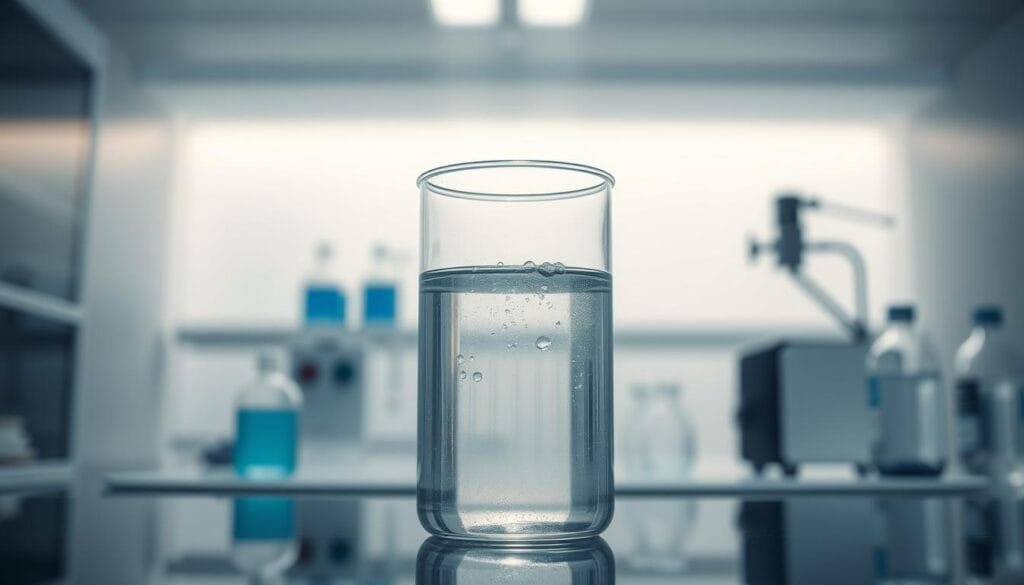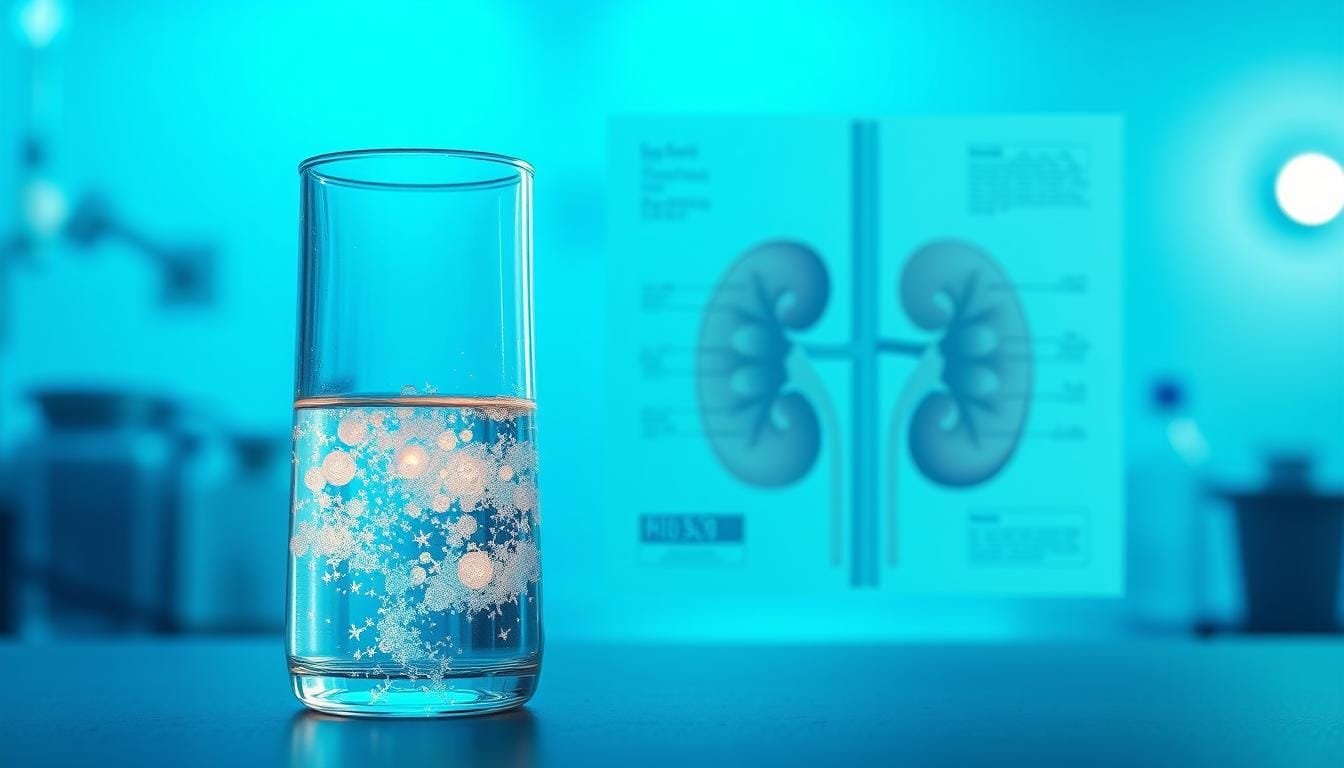Currently Empty: RM0.00
Could a simple beverage change how people think about renal support? This question drives growing interest in Malaysia about whether hydrogen water can play a supportive role alongside medical care.
Hydrogen water is regular water infused with molecular H2, which may act as a selective antioxidant. Scientists note it targets harmful radicals like hydroxyl and peroxynitrite while leaving useful signals intact.
Oxidative stress speeds renal damage and fibrosis. Early animal work and small human studies hint at reduced inflammation and improved markers in dialysis when hydrogen-rich dialysate is used.
Safety matters: this option is generally considered safe as a supplement in many studies, but it is not a cure. People with chronic conditions or fluid limits need medical guidance before adding it to care.
For Malaysians seeking advice, Wellness Concept can explain products and usage. Contact via WhatsApp at +60123822655 during business hours for personalised information.
Key Takeaways
- Hydrogen water may offer selective antioxidant support, not a replacement for medical care.
- Early research shows promise in reducing oxidative stress in animal and small human studies.
- Dialysis contexts have reported beneficial signals with hydrogen-rich dialysate.
- Safety first: consult healthcare providers, especially with fluid or treatment limits.
- Wellness Concept in Malaysia offers guidance via WhatsApp at +60123822655.
Understanding Hydrogen Water: What It Is and Why People Consider It for Kidney Health
Many consumers choose products that produce liquid carrying dissolved molecular hydrogen, such as bottled options, tablets, or small generators. These formats create a water infused with tiny H2 molecules that do not change taste or appearance.
Preparation methods include electrolysis bottles and magnesium-based tablets that generate hydrogen gas in situ. Concentrations are often described in ppm, which shows how much gas dissolves into the liquid.
Why people look at this for kidney health: the dissolved gas may act as a selective antioxidant, targeting highly reactive radicals like hydroxyl and peroxynitrite while supporting enzymes such as GSH, CAT, and SOD. That can help redox balance without blocking useful signaling oxidants.
The kidneys are very vascular and depend on good microcirculation and endothelial function for normal renal function. Those features make oxidative stress and inflammation important targets when people consider supportive approaches for kidney health.
For Malaysians seeking local advice on formats and suitability, contact Wellness Concept via WhatsApp at +60123822655 for personalised guidance.
How Hydrogen Water Might Support the Kidneys
Research suggests small dissolved gas molecules can act on oxidative pathways inside renal tissue. This action could lower the burden of oxidative stress that harms delicate filtering structures.
Selective antioxidant action
Laboratory studies report selective scavenging of hydroxyl radicals and peroxynitrite. That targeted removal of damaging free radicals may protect cells without blocking normal signalling.
Anti-inflammatory effects
Animal models show modulation of endogenous defenses such as GSH, CAT, and SOD, plus downregulation of TNF-α and IL-1β. These changes suggest an anti-inflammatory route that could reduce kidney injury.
Microcirculation, fluid balance, and blood pressure
Early human signals point to improved microvascular flow. Better microcirculation can affect filtration, tissue oxygenation, and short-term blood pressure trends, which may influence overall kidney function.
“These mechanisms are promising, but current data are preliminary.”
- Key note: proposed effects come from preclinical and small clinical studies, not proven therapy.
- Those with fluid limits or multiple medicines should seek clinical advice. Wellness Concept can help coordinate questions for your clinician via WhatsApp: +60123822655.
The Link Between Oxidative Stress and Kidney Disease
Oxidative stress drives a chain of cell injury that speeds scarring in renal tissue. This persistent stress harms cells and the surrounding matrix, which accelerates fibrosis and worsens filtration.
Worldwide, an estimated 850 million people face chronic kidney disease. When oxidants outpace defenses, damage mounts and complications become more likely for the affected organs.
Redox balance and natural defenders
Three core antioxidants keep redox steady: glutathione (GSH), catalase (CAT), and superoxide dismutase (SOD). They neutralize reactive species and protect cells from ongoing harm.
How imbalance drives progression: losing this balance leads to inflammation, cell loss, and structural change that reduce organ function over time.
- Complementary approach: hydrogen water may selectively neutralize the most damaging radicals while leaving helpful signals intact.
- Mechanistic data are promising, but clinical confirmation remains in progress.
| Component | Main Role | Potential Impact |
|---|---|---|
| GSH | Detoxifies reactive molecules | Reduces cell oxidative injury |
| CAT (catalase) | Breaks down hydrogen peroxide | Prevents membrane damage |
| SOD | Converts superoxide to safer forms | Protects microvasculature |
“Selective antioxidant support may help protect fragile tissues while standard care continues.”
Next, the article will review animal and human studies that test these ideas.
What Studies Suggest About Hydrogen Water and Kidney Function
Preclinical trials in rodents have produced measurable signs that dissolved-gas therapies can ease acute renal injury. These findings form the early basis for human exploration.
Animal research: acute injury models
In rat models of sudden renal damage, treated groups showed lower inflammation markers. Biochemical tests and tissue exams reported less cell death and faster recovery of key filtration markers.
Human evidence: signals in chronic kidney disease
Small clinical studies have linked hydrogen water intake to reduced proteinuria and hints of improved estimated glomerular filtration rate. Such trials are limited in size and duration, so conclusions remain tentative.
- Proposed mechanisms: activation of antioxidant pathways (for example, Nrf2 with higher SOD activity) and anti-inflammatory effects.
- Current data are exploratory; larger trials are needed before clinical advice changes for patients.
- Consider this option as complementary rather than curative while standard care continues.
“Early research is promising, but rigorous trials will define real benefit.”
hydrogen water and kidney failure: What Early Human Data Shows in Dialysis
Early clinical work has tested modified dialysate that carries dissolved gas during treatment sessions.
In a notable 2010 study, hemodialysis using enriched dialysate showed lower markers of oxidative stress and inflammation versus standard fluid. Lab values improved during and after sessions in that small trial.
Observational reports added patient-focused signals. When electrolysed hydrogen water was given before or after dialysis, some patients noted less post-treatment fatigue.
Key points:
- Delivery was specific to dialysis circuits or supportive drinking fluids used around sessions.
- Biomarker shifts suggested reduced oxidative burden during treatment.
- Patient reports hinted at better recovery, but these were not randomized results.
- Findings are preliminary; larger controlled studies are needed to confirm effects.
- Use must respect fluid limits and follow the care team’s guidance for each patient.
“Promising signals exist, but robust trials will determine real clinical value.”
Dialysis Contexts: Where Hydrogen-Rich Water Has Been Explored
Dialysis teams have started testing enriched dialysis fluids to see if they lower treatment-linked oxidative damage.

Hemodialysis: reduced oxidative stress during sessions
In small trials, hemodialysis using hydrogen-rich water as dialysate showed lower markers of oxidative stress and inflammation versus standard fluids.
Researchers propose the dissolved agent blunts treatment-related oxidative bursts, which may protect cells during each session.
Peritoneal dialysis: membrane protection and inflammation
Early work suggests hydrogen-infused solutions can help preserve the peritoneal membrane and reduce local inflammation.
Better membrane health may support long-term dialysis adequacy and fewer complications for patients.
Patient experience signals: fatigue and recovery trends
Observational reports note that some patients felt less post-treatment fatigue when electrolysed hydrogen water was used around sessions.
These patient-centered signals matter for quality of life, but they remain anecdotal without larger trials.
- Delivery matters: dialysate versus drinking before or after sessions likely changes the effects and dose exposure.
- Standardizing timing and concentration is needed for consistent results in future trials.
- Multicenter randomized studies are required to validate these promising signals.
- Clinician collaboration is essential before any patient adds this adjunct to care.
| Dialysis Type | Reported Benefit | Evidence Strength |
|---|---|---|
| Hemodialysis (enriched dialysate) | Lower oxidative markers during sessions | Small clinical studies, low to moderate |
| Peritoneal dialysis (infused solutions) | Membrane protection; reduced local inflammation | Preclinical and limited human data |
| Supportive drinking around sessions | Less post-dialysis fatigue reported | Observational, uncontrolled reports |
“These findings are encouraging but not definitive; larger randomized trials will clarify real clinical value.”
Is Hydrogen Water Safe for Kidney Patients?
Clinicians focus first on fluid limits, medication interactions, and proven harms when a new drink is proposed. This section summarizes safety signals and practical steps for people under renal care.
General safety profile
Current literature reports no major adverse effects from consuming enriched liquids in short trials. Regulators in some regions list the ingredient as a supplement, and many studies call the product generally safe.
Fluid intake limits for dialysis and chronic care
Volume counts. Patients with strict fluid rules must include any added drink in their daily allowance. Exceeding limits raises risks for swelling, blood pressure shifts, and heart strain.
Medication and condition check
Clinician review matters. Some medicines—especially blood pressure drugs, diuretics, and binders—may need dose timing adjustments. Sensitive conditions require extra caution.
“Generally safe does not mean universally appropriate.”
- Remember: this option is a supplement, not a therapy.
- Discuss use with a nephrologist and dietitian before starting.
- Wellness Concept provides Malaysia-specific product guidance via WhatsApp at +60123822655.
Practical Tips: How Hydrogen Water May Be Used Responsibly
Practical use focuses on dose control, timing, and verified devices for measurable results.
Start low and move slowly. They should test tolerance with small daily volumes and track symptoms.
Keep total fluids within clinician-prescribed limits. This respects treatment plans and reduces risk for swelling or pressure changes.
- Choose reliable gear: pick certified electrolysis bottles or reputable magnesium tablets that state measurable dissolved H2 concentration.
- Timing: spread intake across the day or align near meals to fit individual hydration routines and dialysis schedules.
- Monitor: record symptoms, blood pressure, and weight to share with the care team after a trial period.
- Approve first: integrate any new supplement only after clinician confirmation, especially when treatments limit fluids.
“Moderate, supervised use may help patients explore small benefits while keeping safety a priority.”
For Malaysia-specific device setup, dosing plans, or tablet recommendations, message Wellness Concept on WhatsApp at +60123822655 during business hours for personalised support.
| Action | Recommendation | Why it matters |
|---|---|---|
| Starting dose | Low, then increase as tolerated | Limits adverse effects and reveals tolerance |
| Product choice | Certified bottles or known-brand tablets | Ensures measurable, consistent effects |
| Scheduling | Spread intake; avoid excess pre-dialysis volume | Aligns with fluid rules and treatment timing |
| Record keeping | Daily notes: symptoms, BP, weight | Provides data for clinical review |
Malaysia Focus: Getting Guidance and Support at Wellness Concept
Wellness Concept helps Malaysians turn emerging signals from research into practical steps that respect clinical plans. The team gives short, evidence-informed advice so patients and caregivers can ask smarter questions at clinic visits.

- Clear explanations of product types and likely benefits for water kidney health and general health.
- Safe-use checklists that fit fluid limits and medication schedules for patients.
- Help drafting questions to bring to a nephrology appointment so conversations stay focused.
- Support for caregivers navigating Malaysian regulations and local availability.
Contact Wellness Concept on WhatsApp at +60123822655
Start a chat to get personalised suggestions or to ask about specific products. The team aims to complement, not replace, clinical care and will point users to current summaries of research when helpful.
hydrogen water for recovery is one resource they can share to explain practical steps and device choices.
“Education-first guidance helps people explore options safely while medical care continues.”
Business Hours and Availability
Wellness Concept keeps set hours so patients know when they can get prompt product and safety guidance.
Office hours (Malaysia): Monday–Friday 9:30 am–6:30 pm; Saturday–Sunday 10:00 am–5:00 pm.
WhatsApp at +60123822655 is the fastest way to reach the team during these hours for short questions or to book a consult.
Suggested actions: book a brief consult to review hydrogen water options, discuss safety with respect to existing care plans, and get device setup help.
Follow-up chats can be scheduled to review progress after clinic visits. The team also shares digital educational materials for easy reference.
- Quick consults to align product use with clinical advice.
- Follow-ups to track tolerance and questions after medical review.
- Digital guides and links sent on request, including resources like hydrogen water for stress relief.
“Contacting the team by WhatsApp during opening hours gives the fastest, personalised support.”
Conclusion
The evidence shows selective antioxidant action with reduced oxidative stress and lower markers of inflammation in lab and small clinical work. This suggests targeted effects that spare useful cell signals.
Animal models and early human studies report improved markers of filtration and less treatment-linked harm, so studies suggest possible support for chronic kidney disease and improved kidney function. These findings are promising but remain preliminary.
Safety in short trials appears acceptable as a supplement, yet use must respect fluid limits and medical plans. Patients should not replace standard care; clinical coordination matters.
For Malaysians seeking practical steps, message Wellness Concept on WhatsApp at +60123822655 to discuss product guidance and questions for their healthcare team.
FAQ
What is infused molecular hydrogen and why do people consider it for kidney health?
Infused molecular hydrogen refers to gas dissolved into drinking liquid, creating a hydrogen-rich beverage. People consider it because research suggests it acts as a selective antioxidant and may reduce oxidative stress and inflammation, two pathways linked to progressive renal damage. They should note that most strong evidence remains in animal studies, with human results still emerging.
How might this therapy support kidney function?
Proposed mechanisms include selective neutralization of harmful free radicals, lowering inflammatory signals, and modest effects on microcirculation and fluid balance. These actions could protect renal cells from injury and slow fibrosis in experimental models, but clinical confirmation is limited.
What does the science say about oxidative stress and chronic kidney disease?
Oxidative stress accelerates tissue injury and scarring in chronic kidney conditions by overwhelming antioxidant defenses. Maintaining redox balance—through enzymes like glutathione, catalase, and superoxide dismutase—is crucial to preserve function and slow progression.
Are there animal or lab studies supporting benefits for renal injury?
Yes. Multiple preclinical studies in acute and chronic injury models report improved biochemical markers, reduced histologic damage, and lower inflammatory mediators after exposure to hydrogen-rich liquids or gas. These findings motivated limited human research but do not guarantee identical results in patients.
What human evidence exists for people with chronic kidney disease?
Early human trials and pilot studies report signals such as reduced proteinuria, improvements in certain filtration markers, and lower oxidative markers in some participants. However, sample sizes are small and results vary, so larger randomized trials are needed before routine recommendation.
Has this been tested in dialysis settings?
Yes. Investigations examined adding dissolved gas to dialysate or providing enriched drinks to patients. Findings suggest reduced oxidative stress during hemodialysis, possible protection of the peritoneal membrane in peritoneal dialysis, and patient-reported trends of less fatigue, though data are preliminary.
Is it safe for people with reduced renal function or on dialysis?
The intervention has a generally favorable safety profile in reported studies, but fluid and electrolyte limits are critical for dialysis or advanced chronic disease. Patients must consult their nephrologist before starting any new supplement or enriched beverage to avoid excess fluid, interactions, or unintended effects.
How should patients use enriched drinks responsibly?
Use small, measured volumes and track total daily fluid allowance set by the care team. Prefer products with third-party quality checks, avoid unregulated devices, and discuss timing relative to dialysis and medications. Follow medical advice rather than self-prescribing based on preliminary studies.
Where can Malaysian patients get guidance or support?
Wellness Concept in Malaysia offers consultations and product guidance. Interested individuals can contact Wellness Concept on WhatsApp at +60123822655 for location, offerings, and personalized advice aligned with their treatment plan.
What are typical business hours and availability for clinics offering guidance?
Clinic hours vary by provider. Patients should call or message the listed contact to confirm opening times, appointment availability, and whether walk-ins are accepted. Always schedule a discussion with a treating clinician before trying new interventions.


